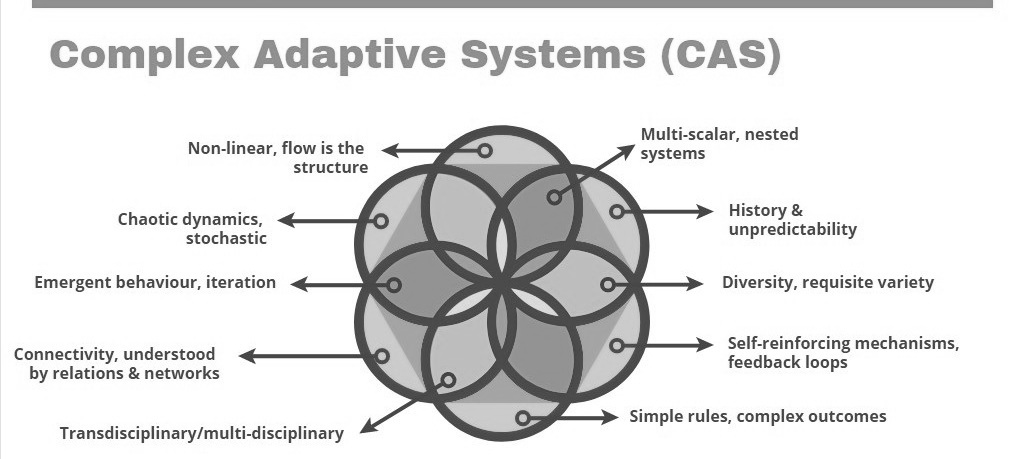Introduction:
Complex Adaptive Systems (CAS) is a powerful mental model that helps us comprehend the intricacies of decision-making. This concept acknowledges that our world is composed of interconnected and dynamic systems where agents, whether individuals or groups, constantly adapt and respond to each other and their environment. Anchored in human psychology, CAS holds significant relevance in decision-making processes and is prevalent in our day-to-day lives. By exploring examples across personal life decisions, business scenarios, and public policy-making, we can gain insights into how falling prey to this fallacy can lead to irrational decisions contrary to our best interests. Moreover, we will delve into the mental biases and psychological underpinnings associated with CAS, providing practical strategies to identify and navigate the complexities of this mental model.
Defining Complex Adaptive Systems:
Complex Adaptive Systems refer to networks of interconnected elements that exhibit collective behaviors and adaptability in response to changes in their environment. These systems are characterized by emergence, non-linearity, feedback loops, and self-organization. In the context of decision-making, CAS recognizes that outcomes are the result of interactions between various agents, where individual decisions and actions can have cascading effects on the overall system.
Examples of Complex Adaptive Systems in Action:
Personal Life Decisions:
Imagine an individual deciding on a career path. They might gather information, seek advice, and make choices based on their aspirations and skills. However, their decisions are not isolated but influenced by the larger system of the job market, economic trends, and societal dynamics. Their career choices are not solely determined by personal preferences but are shaped by external factors and the behaviors of other individuals within the system.
Business Scenarios:
In the business world, CAS can be observed in market dynamics and competition. Consider a company launching a new product. Its success is not solely dependent on internal factors such as product quality and marketing efforts. It is influenced by customer preferences, competitors’ strategies, and market trends. The interactions and adaptations of various stakeholders within the complex adaptive system of the market play a crucial role in shaping the business outcomes.
Public Policy-Making:
Public policy-making involves complex adaptive systems due to the interactions between policymakers, interest groups, citizens, and the broader societal context. When formulating policies, policymakers must consider the diverse perspectives, feedback loops, and the potential unintended consequences that emerge from the interactions within the system. Failure to recognize the complexity of the system can lead to ineffective policies that do not achieve the desired outcomes.
Mental Biases and Psychological Underpinnings:
Several mental biases contribute to the challenges of navigating complex adaptive systems. One such bias is reductionism, the tendency to simplify complex situations by focusing on individual elements and overlooking the interconnectedness and emergent properties of the system as a whole. Anchoring bias can also hinder decision-making in CAS, as individuals may cling to initial beliefs or data points, neglecting new information that emerges from the system dynamics.
Additionally, cognitive overload and information biases can overwhelm decision-makers when confronted with vast amounts of interconnected data and complex relationships within the system. This can lead to decision paralysis or biases in processing information, such as confirmation bias or availability bias.
Strategies to Navigate Complex Adaptive Systems:
Embrace Systems Thinking: Develop a holistic perspective by considering the interconnections, feedback loops, and emergent properties within the system. Look beyond isolated components and explore how they interact and influence each other.
Foster Adaptive Learning: Encourage a culture of continuous learning and adaptation. Embrace experimentation, feedback, and iteration to respond effectively to changes within the system. Be open to new information and willing to revise strategies based on emerging insights.
Build Collaborative Networks: Engage diverse stakeholders and foster collaboration to leverage collective intelligence. Seek multiple perspectives and expertise from various domains to enhance decision-making in complex adaptive systems.
Employ Scenario Planning: Anticipate and prepare for multiple plausible scenarios within the system. Develop alternative strategies and contingency plans to adapt to different outcomes and mitigate risks.
Conclusion:
Complex Adaptive Systems significantly influence decision-making processes in our personal lives, businesses, and public policies. By understanding the dynamics of CAS and the interplay of agents within the system, we can make more informed decisions that account for the complexity and interconnectedness of our world. Recognizing the mental biases and challenges associated with CAS empowers us to navigate these systems with greater clarity and objectivity. Awareness and active avoidance of the reductionist fallacy and other biases will enable us to harness the potential of complex adaptive systems, leading to more effective decision-making and positive outcomes in our ever-evolving world.
